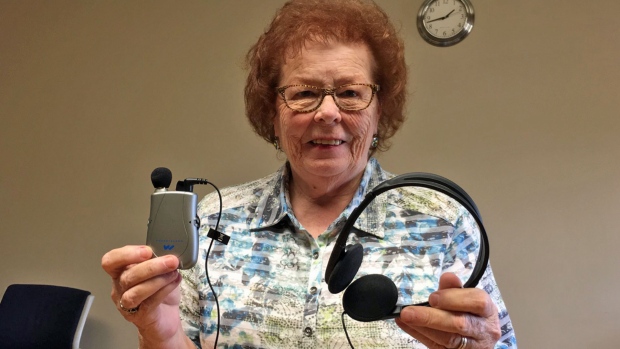July 22, 2017. A few days ago, CHHA PEI Chapter President Annie Lee MacDonald and I were interviewed for CBC’s Island Morning radio broadcast on the pocket talker project for lawyers to improve communication with the hard of hearing, a project funded by the Law Foundation of PEI. Lawyer Robin Aitken, one of the project participants, was also interviewed. To access the radio interview, the link is below, as is an accompanying article on the CBC website that follows our blog entry explaining the project.
Radio interview:
http://www.cbc.ca/player/play/1005563459560

Photo: Annie Lee MacDonald with pocket talker. (Photo credit: Sarah MacMillan/CBC)
When you are hard of hearing and have to deal with professional services, such as a lawyer, it can be difficult. The voices are unfamiliar to your ear, terminology may be a barrier, and no one goes to a lawyer just to socialize. Do you admit you can’t really hear what is being said? Should you take along a friend or family member to act as your pair of ears?
With financial support from the Law Foundation of PEI, CHHA PEI is helping to remove some of the stress and barriers to communication when dealing with the legal community, through a pilot project of using assistive listening devices, commonly known as pocket talkers. This device makes it easier for the hard of hearing to communicate.
Lawyers across the island are volunteering to participate in the pilot project, and actively encourage hard of hearing clients to help test this technology. “Confidentiality is very important,” noted several lawyers. Other positive (there have not been any negative ones) comments include: “A technological tool that helps us to communicate better is important.” “It’s a great idea. I can see the need.”
One lawyer noted that he uses the pocket talker himself, as well as for his hard of hearing clients. “I never realized that I myself had a hearing loss!” Another lawyer commented, “I had stopped going to hospitals and nursing homes to see clients, because of the lack of privacy and me having to shout to be heard. Now that my clients in hospitals and nursing homes can put on the pocket talker and we can have a quiet conversation, I am holding meetings there again.”
So far, this has been a win-win project for Island lawyers and for the hard of hearing. As the Chief Justice of PEI notes, “Effective sharing of legal information and opportunity for participation in legal proceedings are integral components to access to justice. This initiative to facilitate a better understanding of the law and improved communication for people who are hard of hearing is to be commended.”
TIP! Bill Droogendyk of Better Hearing Solutions gave us this tip for using a pocket talker: “If you use the Pocketalker with a Neckloop (https://www.williamssound.com/catalog/nkl-001, instead of headphones), then you can hear the Pocket Talker through the hearing aid telecoils – for better sound!” Thanks Bill!
Do you use a pocket talker? Have you taken it to a meeting with your lawyer or doctor? Are you a lawyer who has participated in the project? Let us know! We need your feedback. You can comment through this blog, or send us an email to hearpei@gmail.com .
See below for the text of a CBC article that accompanied the radio broadcast:
CBC website article:
http://www.cbc.ca/news/canada/prince-edward-island/pei-pocketalkers-lawyers-1.4215474
Hard of hearing clients get help talking with lawyers
Pilot project offers lawyers trial with assistive device
By Kevin Yarr, CBC News
Some Island lawyers now have a tool to help them better communicate with people who have hearing loss.
As part of a pilot project, the P.E.I. Chapter of the Canadian Hard of Hearing Association has distributed 10 assistive listening devices to interested lawyers.
‘This is a very important time in a person’s life.’ – Annie Lee MacDonald
The Pocketalkers allow a person to wear a headset, and amplify a person’s voice.
“If you’re hard of hearing, which I am, you have to depend on assistive devices to ensure that you have the best communication possible when you are chatting with different people,” said P.E.I. Chapter president Annie Lee MacDonald.
“We saw a need there, because this is a very important time in a person’s life, when they’re making some personal decisions regarding the future of their estates, or future of their lives.”
The lawyers will get to use the devices for about three months, and then decide if they would like to buy one.
MacDonald said she has received a lot of positive feedback, and several lawyers have already decided to buy a device. She hopes eventually all Island lawyers will have a Pocketalker.
© Daria Valkenburg